
Episode 81 Summary
Viewers get to do some serious English Grammar work in this Episode as we use the Past Perfect verb tense to relate events in the past in relation to other events that happened in the past. We continue the Cherokee Creation Story. We also watch an interview that explores what happened to the Clovis People – once believed to be the first people to live in America.
Participles
Scroll to the end of this page to find a long list of Verbs as Past Participles. Remember, they must have a helping verb.
Viewing Episode 81
All episodes of Ramping Up your English are posted on Archive.org; and Episode 81 is no exception. The following link will take you right to this episode on the archive. Click here to see the entire Episode as seen on RVTV.
Watching in Segments
Episodes of Ramping Up your English are around 30 minutes in length. If that’s a bigger chunk of time than you have to devote to watching, you may enjoy the shorter segments – each around 10 minutes.
If you want to watch Segment One of Episode 81, click here.
Language Objectives
Relate an event in the past in relation to another event that took place in the past, using the Past Perfect Verb tense. Use regular and irregular past tense verbs to relate an event or situation from the past. Using a chart of irregular participles, form the Past Perfect tense of a verb.
Academic Content Objectives
Trace the migration of America’s first human population to a general point of Origen. Name an object that’s identified with the Clovis People. Relate at least two theories why mega fauna became extinct in North and South America. Explain a possible purpose of an Origin Story.

Video Clips Used in this Episode
To see the interview from the University of Wyoming about the Clovis people, click here.
Linked Videos
Click here for a video about mastodon bones found in Missouri and the forming of a state park there.
There’s also a great video about the peopling of the North American Southeast. Click here to watch that video.
For a video about the early people of Colorado, Click here.
We featured part of a Cherokee Creation Story. Click here to see a printed copy of a Cherokee Story about Cedar Trees.
I found a link to a source of Native American Stories. Click here to go to that page at a public Library site.
Learning Materials in Episode 81
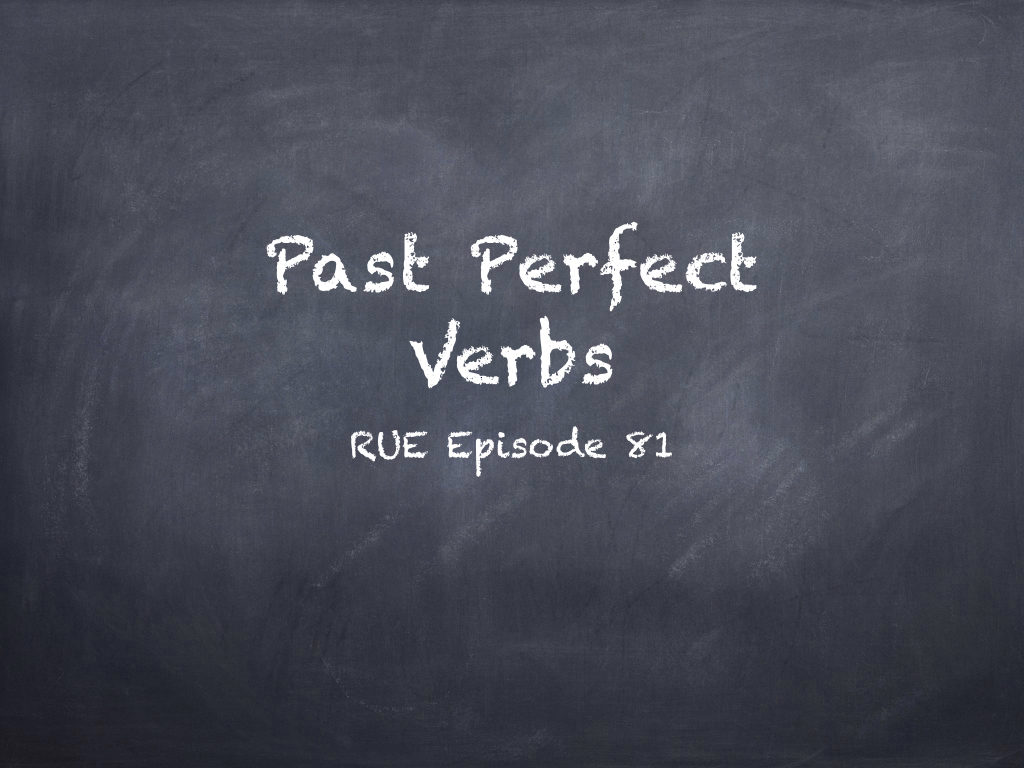
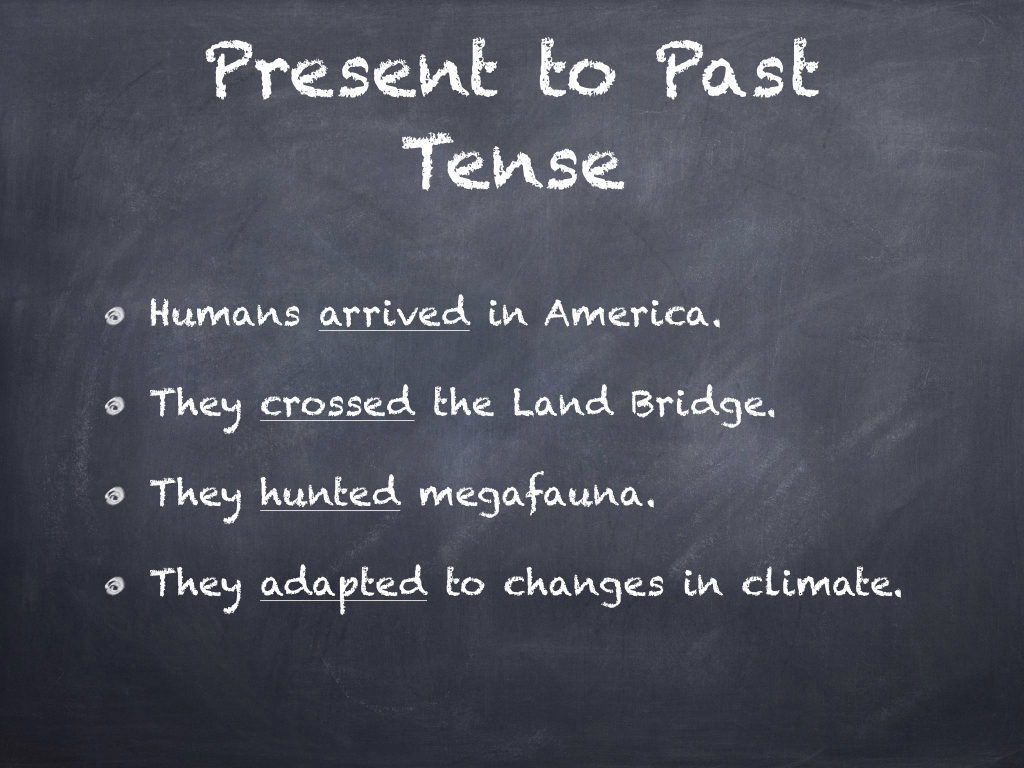
<<Coming Soon. Please check back>>
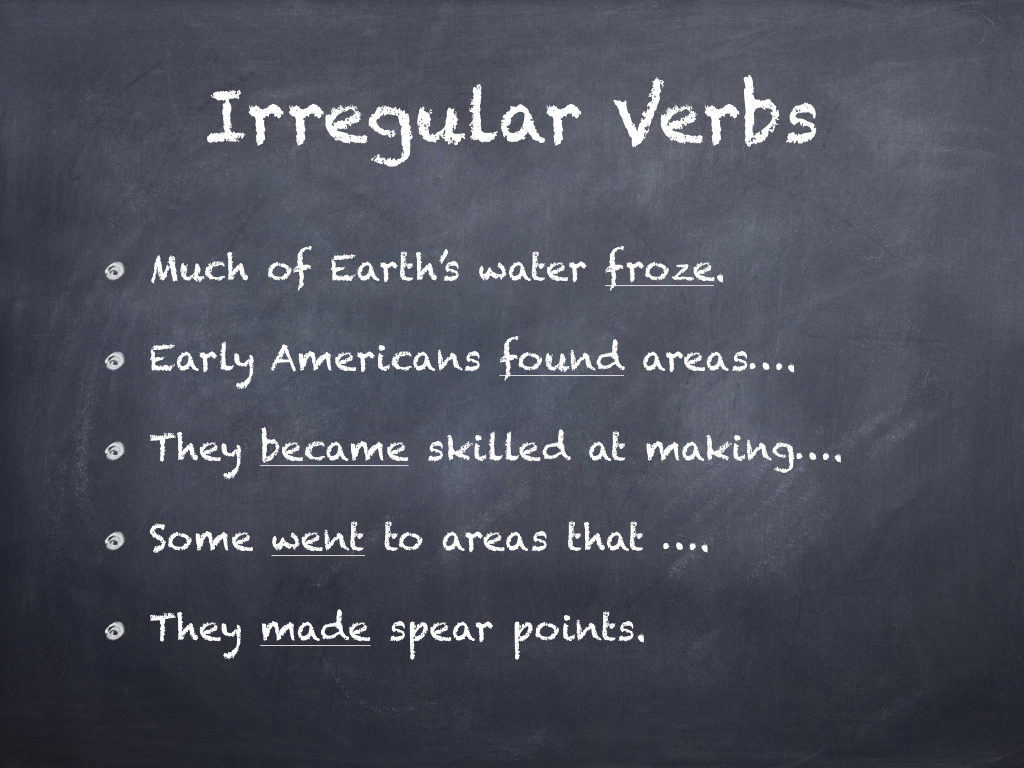
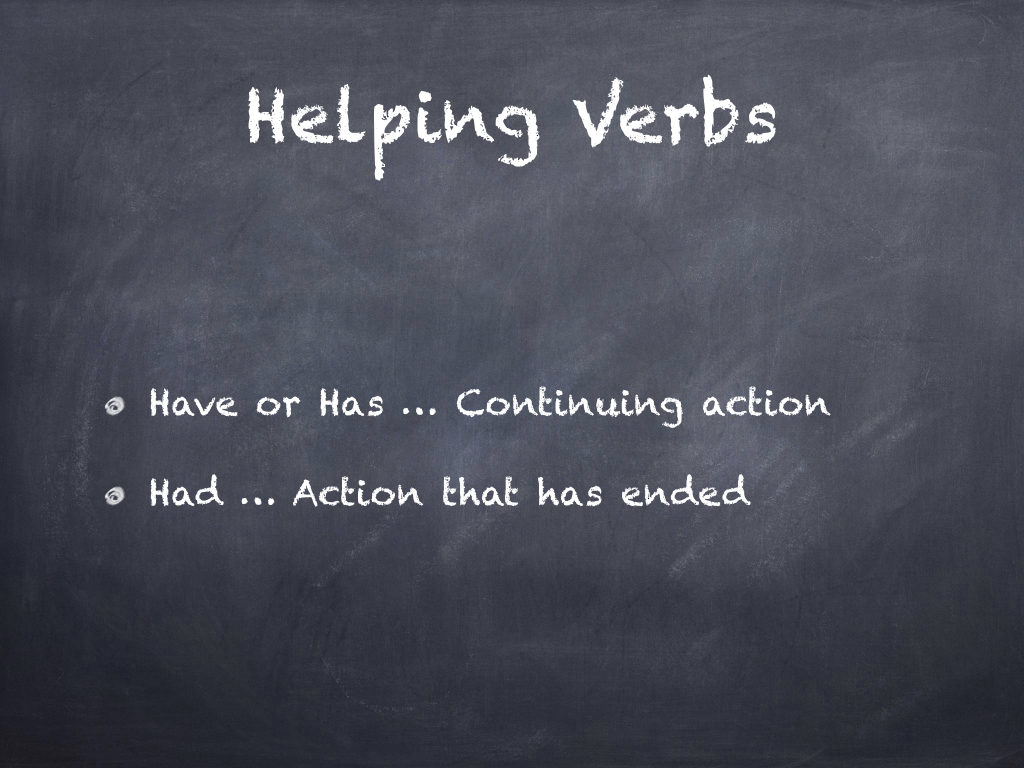
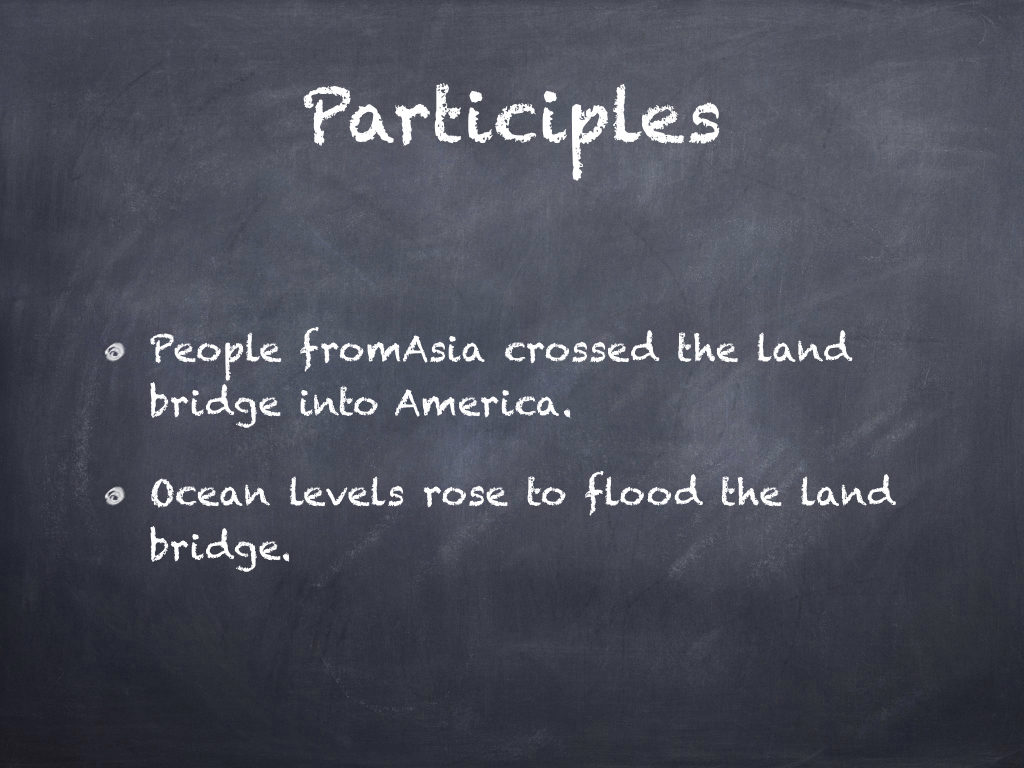
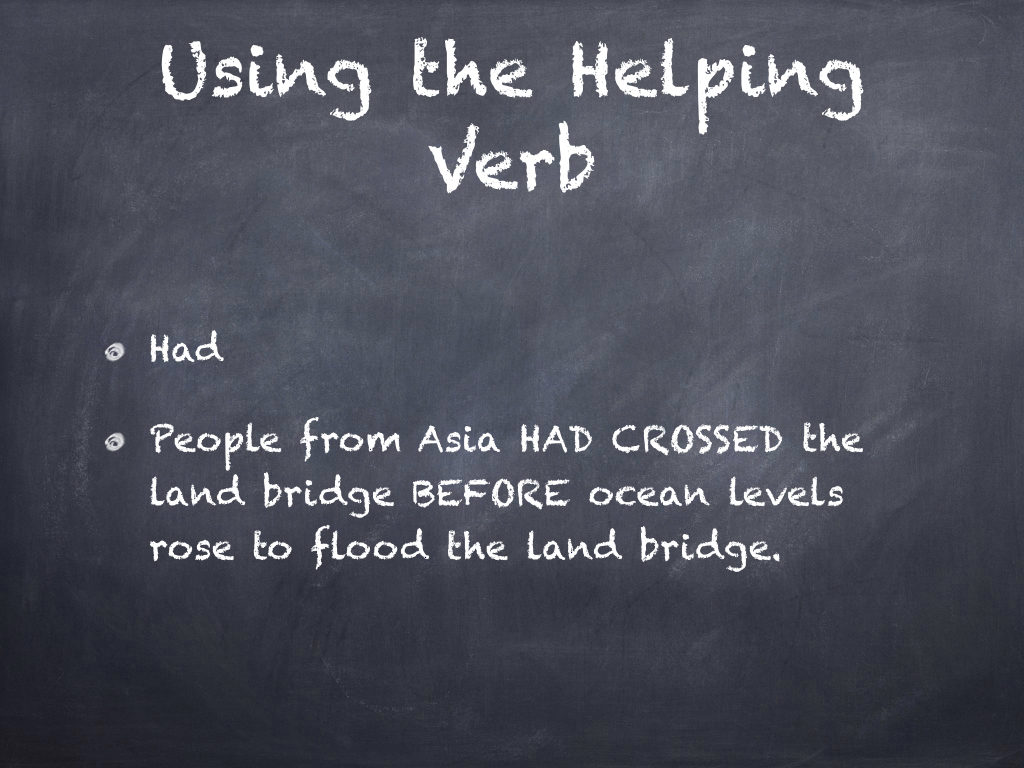
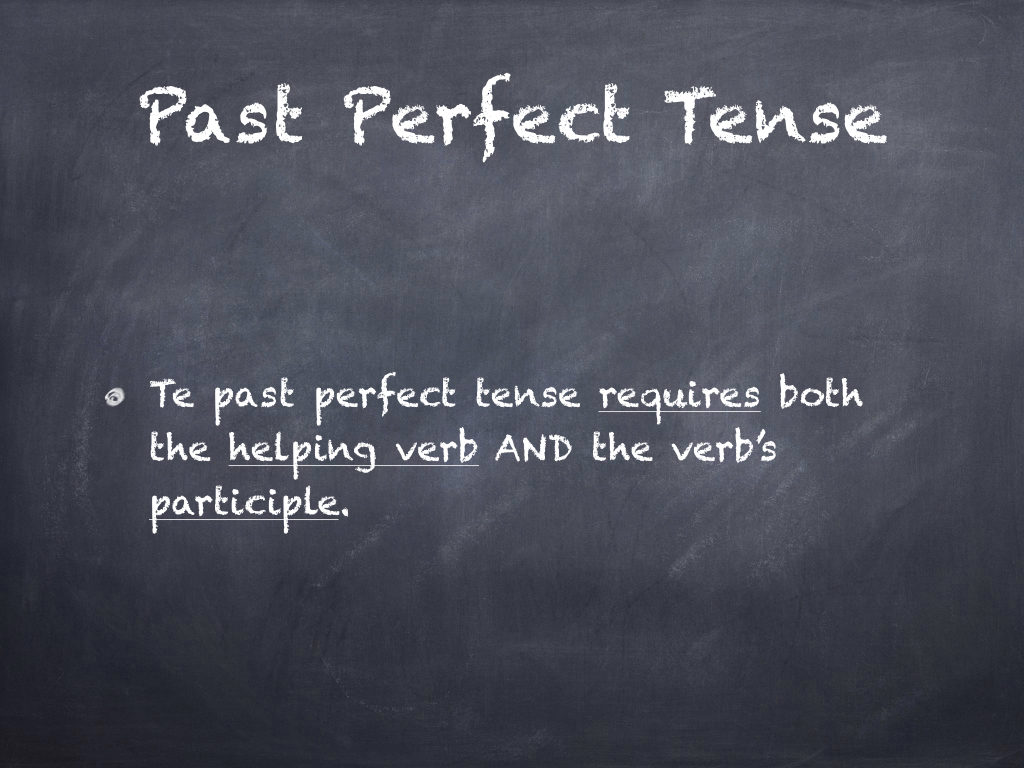
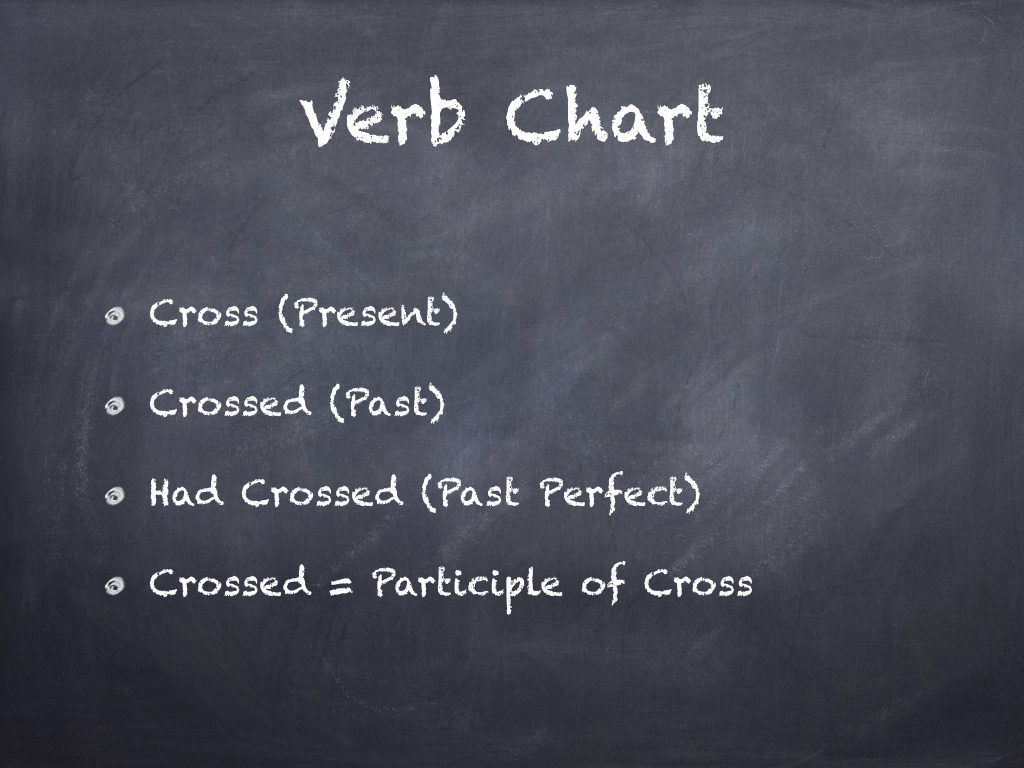
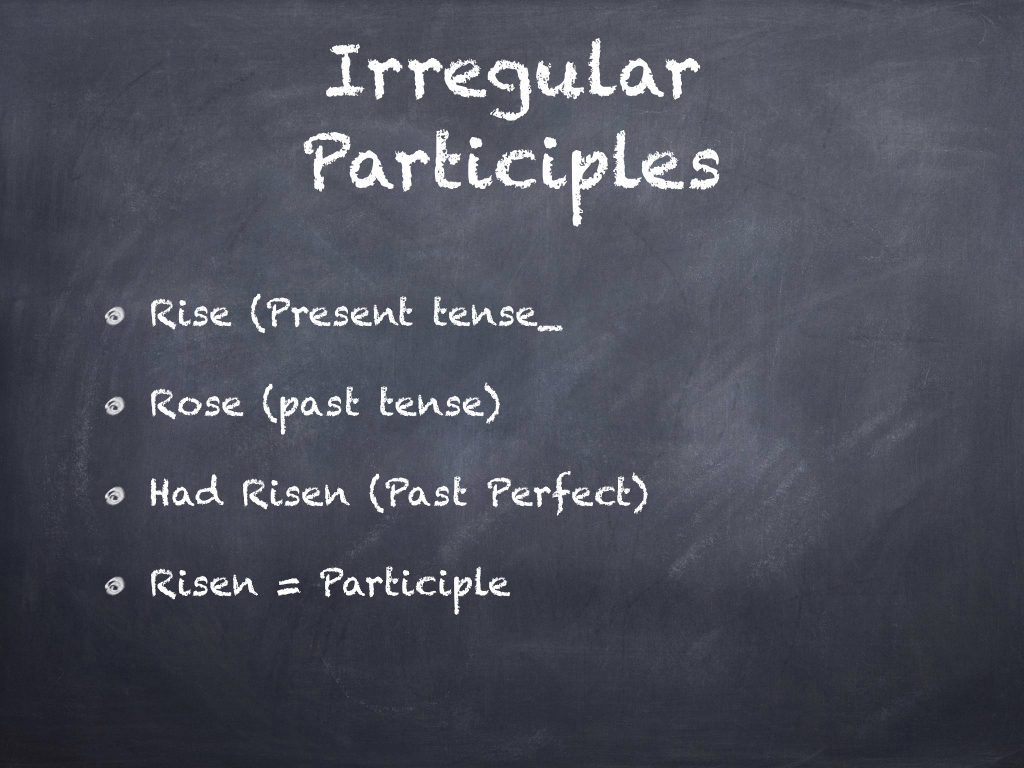
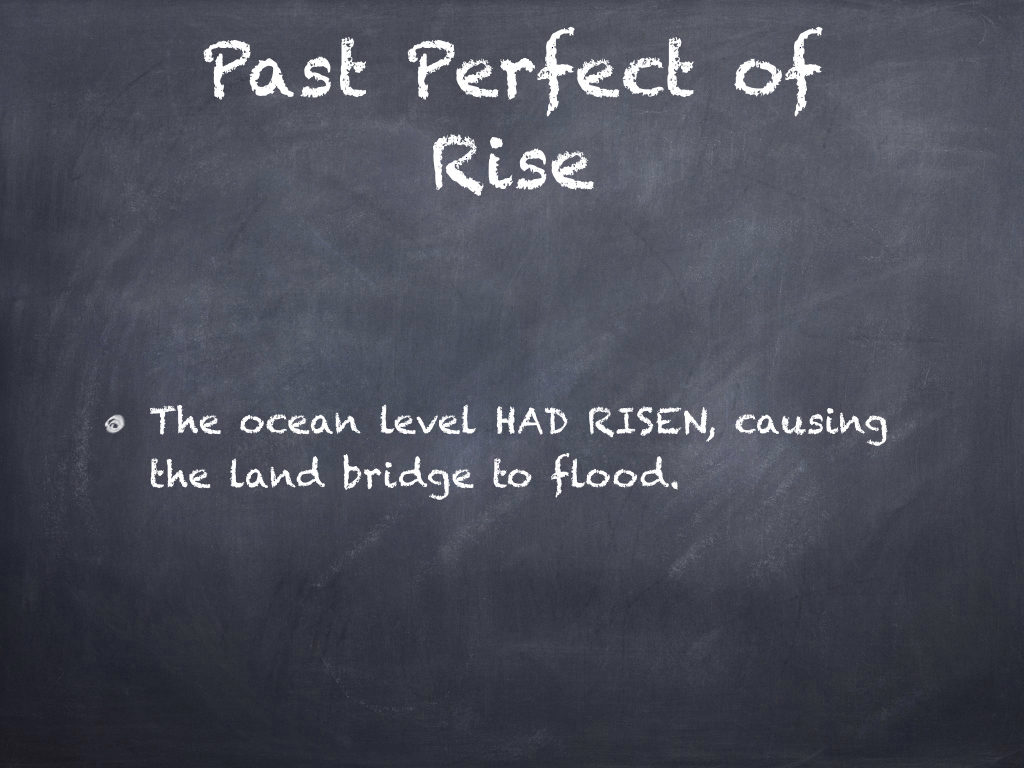
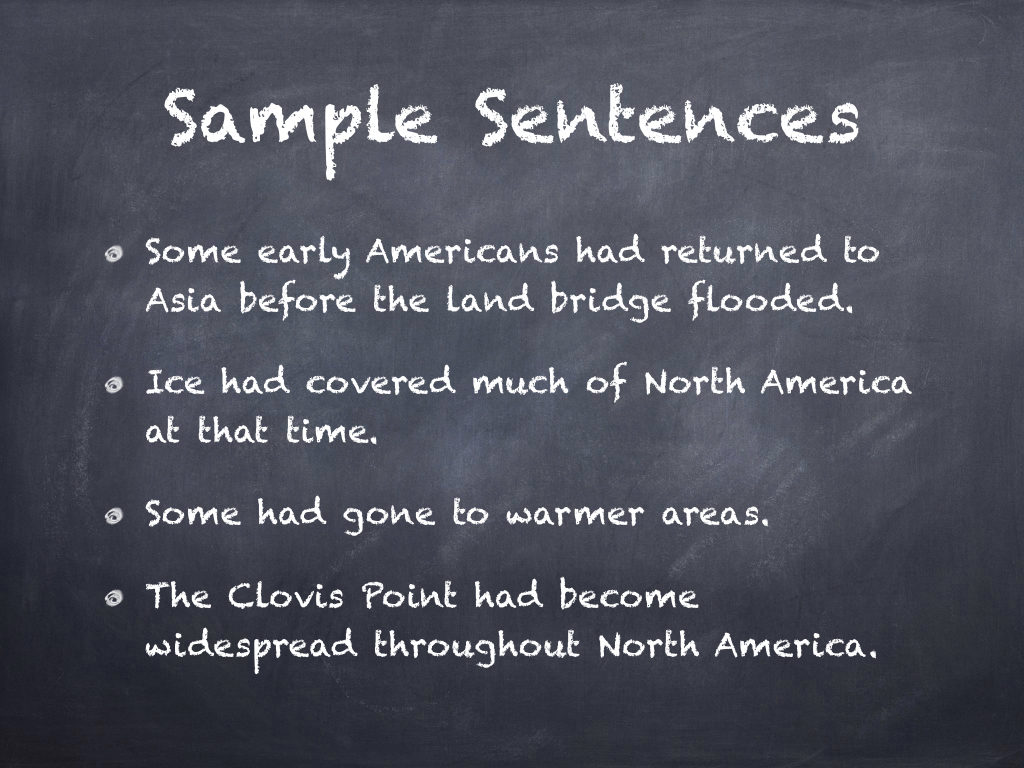
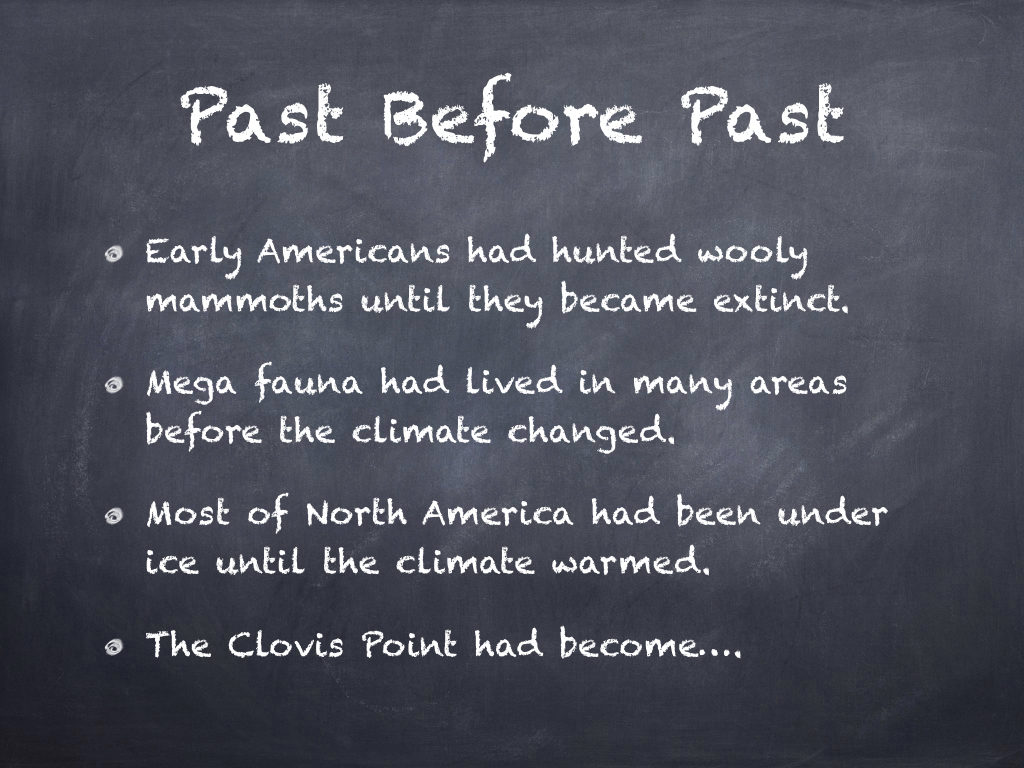
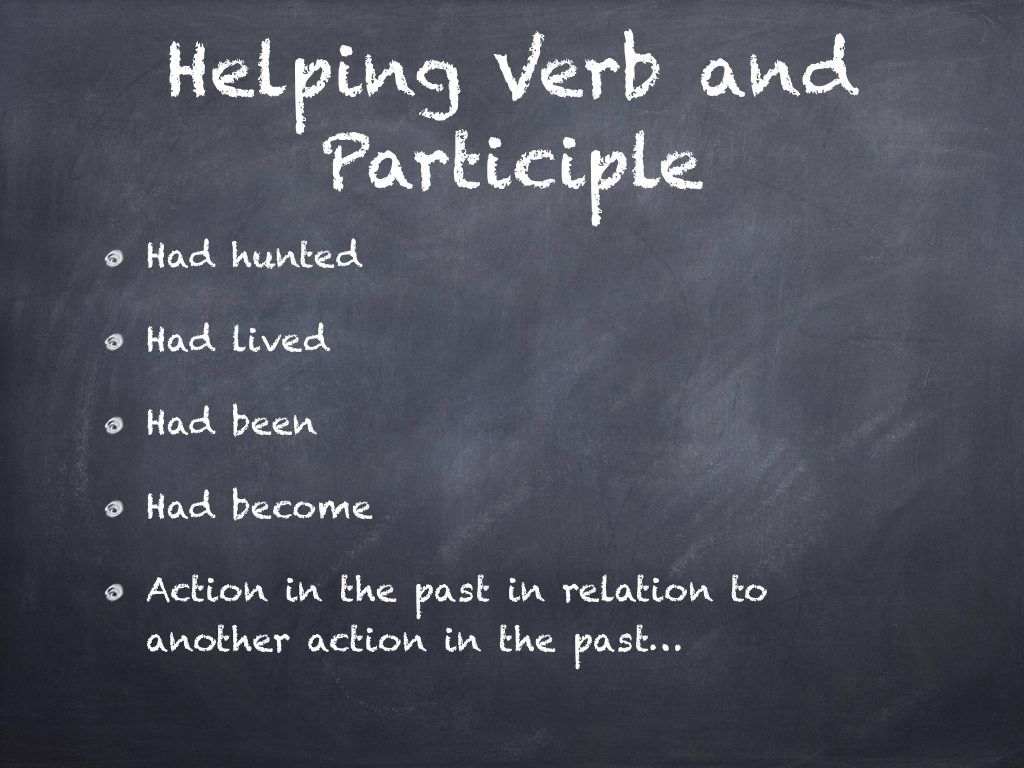
List of Past Participles
Below are verbs that have irregular past participle forms. If you’re using a verb that’s not in the list for forming the Past Perfect tense, use the simple past tense of the present tense verb. Example: cross = Crossed. Many had crossed the land bridge before it was flooded.
I want to acknowledge Wikipedia as the source for this list. I did some light editing for clarity and to reflect American usage. On each line, the first word in the present tense. The second in the Past Tense, and the third listing is the Past Participle. When words are separated by a slash, either one can be used. Burned/burnt…..Native Americans had burned areas for strong regrowth. Native Americans had burnt areas for strong regrowth.
be (am, is, are) – was, were – been
bear – bore – borne
beat – beat – beaten
begin – began – begun
bend – bent – bent
bet – bet – bet [past tense and participle also sometimes betted]
bid – bid – bid [as in an auction]
bide – bided/bode – bided/bidden [but abide mostly uses the regular forms only]
bind – bound – bound
bite – bit – bitten
bleed – bled – bled
blow – blew – blown
break – broke – broken
breed – bred – bred
bring – brought – brought
build – built – built
burn – burnt/burned – burnt/burned
burst – burst – burst
buy – bought – bought
cast – cast – cast [prefixed forms broadcast, forecast, etc. sometimes take -ed[5]]
catch – caught – caught
choose – chose – chosen
cleave – clove/cleft – cloven/cleft [but regular when meaning “adhere”]
cling – clung – clung
come – came – come
cost – cost – cost
creep – crept/creeped – crept/creeped
crow – crowed/crew – crowed
cut – cut – cut
deal – dealt – dealt
dig – dug – dug
dive – dived/dove – dived [the form dove is chiefly American]
do (does /dʌz/) – did – done
drag – dragged/drug – dragged/drug
draw – drew – drawn
dream – dreamed/dreamt – dreamed/dreamt
drink – drank – drunk
drive – drove – driven
dwell – dwelt/dwelled – dwelt/dwelled
eat – ate – eaten
fall – fell – fallen
feed – fed – fed
feel – felt – felt
fight – fought – fought
find – found – found
fit – fit/fitted – fit/fitted
flee – fled – fled
fling – flung – flung
fly – flew – flown
forbid – forbade/forbid – forbidden
forget – forgot – forgotten
forsake – forsook – forsaken
freeze – froze – frozen
get – got – gotten/got
give – gave – given
go – went – gone
grind – ground – ground
grow – grew – grown
hang – hung/hanged – hung/hanged
have (has) – had – had
hear – heard – heard
hide – hid – hidden
hit – hit – hit
hoist – hoist/hoisted – hoist/hoisted
hold – held – held
hurt – hurt – hurt
keep – kept – kept
kneel – knelt/kneeled – knelt/kneeled
knit – knit/knitted – knit/knitted
know – knew – known
lay – laid – laid
lead – led – led
lean – leaned/leant – leaned/leant
leap – leaped/leapt – leaped/leapt
learn – learned – learned
leave – left – left
lend – lent – lent
let – let – let
lie – lay – lain […Had Lain down]
light – lit/lighted – lit/lighted
lose – lost – lost
make – made – made
mean – meant – meant
meet – met – met
mow – mowed – mowed/mown
over- : for overbid, overdo, etc. see bid, do, etc.
pay – paid – paid [but sometimes spelled regularly when meaning “let out” (rope etc.)]
plead – pleaded/pled – pleaded/pled
prove – proved – proved/proven
put – put – put
quit – quit – quit
read /riːd/ – read /rɛd/ – read /rɛd/
rid – rid/ridded – rid/ridded/ridden
ride – rode – ridden
ring – rang – rung
rise – rose – risen
run – ran – run
saw – sawed – sawn/sawed
say (says /sɛz/) – said – said
see – saw – seen
seek – sought – sought
sell – sold – sold
send – sent – sent
set – set – set
sew – sewed – sewn
shake – shook – shaken
shear – sheared/shore – shorn
shed – shed – shed
shine – shone/shined – shone
shoe – shoed/shod – shod
shoot – shot – shot
show – showed – shown
shrink – shrank/shrunk – shrunk
shut – shut – shut
sing – sang – sung
sink – sank – sunk
sit – sat – sat
slay – slew/slayed – slain
sleep – slept – slept
slide – slid – slid
sling – slung – slung
slink – slunk – slunk
slit – slit – slit
smell – smelled/smelt – smelled/smelt
smite – smote – smitten
sneak – sneaked/snuck – sneaked/snuck [snuck is chiefly American, is regarded as informal and is only cited from 1887[6]]
sow – sowed – sown/sowed
speak – spoke – spoken
speed – sped – sped
spell – spelled – spelled/spelt
spend – spent – spent
spill – spilled/spilt – spilt
spin – spun – spun
spit – spat/spit – spat/spit [the form spit rather than spat is common in America]
split – split – split
spoil – spoiled/spoilt – spoiled/spoilt
spread – spread – spread
spring – sprang/sprung – sprung
stand – stood – stood
steal – stole – stolen
stick – stuck – stuck
sting – stung – stung
stink – stank – stunk
strew – strewed – strewn
stride – strode – stridden
strike – struck – stricken
string – strung – strung
strive – strove – striven
swear – swore – sworn
sweat – sweated/sweat – sweated/sweat
sweep – swept – swept
swell – swelled – swollen
swim – swam – swum
swing – swung – swung
take – took – taken
teach – taught – taught
tear – tore – torn
tell – told – told
think – thought – thought
thrive – thrived/throve – thrived/thriven
throw – threw – thrown
thrust – thrust/thrusted – thrust
tread – trod – trodden
wake – woke – woken
wear – wore – worn
weave – wove – woven
wed – wed/wedded – wed/wedded
weep – wept – wept
wet – wet/wetted – wet
win – won – won
wind – wound – wound [but regular in the meanings connected with air and breath]
wring – wrang– wrung
Next Episode:
What did researchers find in Cougar Mountain Cave? Find out in the next Episode of Ramping Up your English. Click here to visit the Episode 82 page.